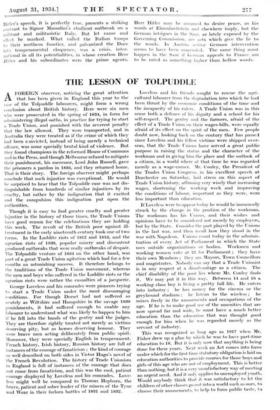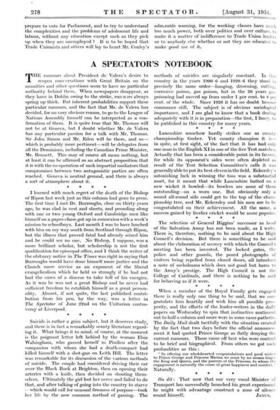THE LESSON OF TOLPUDDLE
AFOREIGN observer, noticing the great attention that has been given in England this year to the case of the Tolpuddle labourers, might form a wrong conclusion about British history. Here were six men who were prosecuted in the spring of 1834, in form for administering illegal oaths, in practice for trying to start a Trade Union, and punished with the severest penalty that the law allowed. They were transported, and in Australia they were treated as if the crime of which they had been convicted, instead of being merely a technical offence, was some specially brutal kind of violence. But they found champions in the reformed House of Commons and in the Press, and though Melbourne refused to mitigate their punishment, his successor, Lord John Russell, gave the prisoners a pardon in 1836, and they returned home. That is their story. The foreign observer might perhaps conclude that such injustice was exceptional. He would be surprised to hear that the Tolpuddle case was not dis- tinguishable from hundreds of similar injustices by its cruelty, but rather by the indignation that it excited and the compulsion this indignation put upon the authorities.
Though it is easy to find greater cruelty and greater injustice in the history of those times, the Trade Unions have good reason for the celebrations they are holding this week. The revolt of the British poor against ill- treatment in the early nineteenth century took one of two forms. In the Luddite riots of 1812 and 1813, and the agrarian riots of 1880, popular misery and discontent produced outbreaks that were really outbreaks of despair. The Tolpuddle venture of 1884 on the other hand, was part of a great Trade Union agitation which had for a few months an astonishing success. It therefore belongs to the traditions of the Trade Union movement, whereas the men and boys who suffered in the Luddite riots or the agrarian riots were rather the casualties of a jacquerie.
George Loveless and his comrades were pioneers trying to start a Trade Union under the most discouraging conditions. For though Dorset had not suffered so acutely as Wiltshire and Hampshire in the savage 1880 punishments, it had suffered enough to enable any labourer to understand what was likely to happen to him if he fell into the hands of the gentry and the judges. They are therefore rightly treated not merely as victims deserving pity, but as heroes deserving honour. They were brave men acting deliberately from public spirit. Moreover, they were specially English in temperament. French history, Irish history, Russian history are full of instances of the courage of fanaticism ; the kind of courage so well described on both sides in Victor Hugo's novel of the French Revolution. The history of Trade Unionism in England is full of instances of the courage that does not come from fanaticism, and this was the cool, patient courage displayed by Loveless and his comrades. Love- less might well be compared to Thomas Hepburn, the brave, patient and sober leader of the miners of the Tyne and Wear in their forlorn battles of 1831 and 1882. Loveless and his friends sought to rescue the agri- cultural labourer from the degradation into which he had been thrust by the economic conditions of the time and the incapacity of his rulers. A Trade Union was in this sense both a defence of his dignity and a school for his self-respect. The gentry and the farmers, afraid of the effect of a Trade Union on their wages-bills, were equally afraid of its effect on the spirit of the men. Few people doubt now, looking back on the century that has passed since Loveless and his fellow victims were shipped over- seas, that the Trade Unions have served a great public purpose in raising the status and the character of the workman and in giving him the place and the outlook of a citizen, in a world where at. that time he was regarded merely as a wage-earner. Mr. Conley, the President of the Trades Union Congress, in his excellent speech at Dorchester on Saturday, laid stress on this aspect of Trade Union history, affirming very wisely that increasing wages, shortening the working week and improving the conditions of labour, important as they were, were less important than education.
If Loveless were to appear today he would be immensely struck by the change in the position of the workman. The workman has his Unions, and their wishes and opinions have to be considered not merely by employers, but by the State. Consider the part played by the Unions in the last war, and then recall how they stood in the war with Napoleon. Unions count today in the adminis- tration of every Act of Parliament in which the State uses outside organizations or bodies. Workmen and working women vote at 21 for Parliament ; they have their own Members ; they arc Mayors, Town Councillors and magistrates. Nobody can say that a Trade Unionist is in any respect at a disadvantage as a citizen. The chief disability of the poor lies where Mr. Conley finds it. We may put it in this way. Between 14 and 18 a working class boy is living a pretty full life. He enters into industry ; he has money for the cinema or the greyhound stadium ; he listens to the wireless ; he mixes freely in the amusements and occupations of the age. If he is to make good use of the amenities that arc now spread far and wide, he must have a much better education than the education that was thought good enough for him when he was regarded merely as the servant of industry.
This was recognized as long ago as 1917 when Mr. Fisher drew up a plan by which he was to have part-time education to 18. But it is only now that anything is being done for these years. Next week an Act comes into force under which for the first time statutory obligation is laid on education authorities to provide courses for those boys and girls of this age who are out of employment. This is better than nothing, but it is a very unsatisfactory way of meeting an urgent need. And it only applies to unemployed youth. Would anybody think that it was satisfactory to let the children of other classes go out into a world such as ours, to choose their amusements, to help to form public taste, to prepare to vote for Parliament, and to try to understand the complexities and the problems of adolescent life and labour, without any education except such as they pick up when they are unemployed ? It is to be hoped that Trade Unionists and others will lay to heart Mr. Conley's admirable warning, for the working classes have much too much power, both over politics and over culture, to make it a matter of indifference to Trade Union leaders or to anybody else whether or not they are educated to make good use of it.







































 Previous page
Previous page